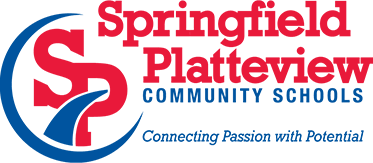Teaching & Learning
Springfield Platteview Community Schools believes educating the whole child is a team effort. The whole-child approach to teaching supports and nurtures all areas of children's development and learning.
Teaching and learning is a process. As a district, we recognize the importance of providing our teachers with the appropriate tools to engage all learners and offer each student the skills to be successful while maximizing the depth of learning our students achieve. Through curriculum, instruction, and assessment, we ensure that each student has the opportunity to learn.
Curriculum
Springfield Platteview Community Schools provide a pertinent, quality curriculum designed to meet state and local expectations. Our curriculum is chosen to ensure our students learn and remain competitive in every content area. Depending on the student's short/long-term goals, we want to provide them with whatever comes next after Springfield Platteview Community Schools. As a district, we use a phased cycle.
Stage 1: Pre-assessment - identify learning goals Stage
Stage 2: Assessment - write quality assessments that align to the learning goals in the pre-assessment phase
Stage 3: Implementation and Evaluation - create unit designs and collect achievement data to ensure high-level learning.
Instruction
Springfield Platteview Community Schools believes that delivering instruction using research-based best practices is crucial. The classroom teacher is one of the strongest influences on student achievement and is within the control of the educational system. The district knows and continues to grow to strengthen and support strong pedagogy within the system.
The district has developed an instructional framework based on the work of educational researchers/consultants Robert Marzano, Jay McTighe, Grant Wiggins, and John Hattie. This framework outlines elements of instruction based on best practices. By using the framework, teachers are asked to address questions that will help them clearly define learning goals (Stage I), align goals with high-quality assessments (Stage II), and design learning experiences more purposefully to reach those learning goals (Stage III).
Many factories make up quality instruction. The district has summarized its expectations in its instructional framework.
Assessments
Assessment is a vital part of the teaching and learning process. At SPCS, we utilize a variety of informal and formal assessments to review our curriculum and instructional techniques and determine students' progress and achievement. Teachers administer joint district summative assessments for each content area/course at each grade level. The norm-referenced assessments that are given in the district are described below:
- Teaching Strategies GOLD: Pre-kindergarten
- FastBridge: Math and reading kindergarten through sixth grade
- NWEA's MAP Growth: Kindergarten through eight is administered two times per year in the fall and spring (winter is optional) to monitor progress. Grades nine and ten are administered once a year to continue to monitor student progress. The district assesses kindergarten through tenth grade in reading, math, and science in grades fifth through tenth.
- Pre-ACT: Grade ten; administered each spring
- ACT: Grade 11; state test administered each spring
- PSAT/NMSQT: This is available for some sophomores. It is optional for students if they are interested in this assessment.
Wellness
The district has a policy regarding school wellness. As a district, we will provide educational experiences in a health-promoting school environment to instill lifelong learning and health habits. Please see our school wellness policy for more information.
The district completed the triennial assessment in May of 2020. A summary of the results includes that, as a district, all indicators were believed that our current policy consists of some of the required language. A strength of the current policy is that it includes specific goals and has physical activity opportunities. A copy of the wellness summary can be found here.
If you would like to learn more about the policy or if you would like to be involved with this committee's work, please get in touch with Heidi Zierott, Director of Learning.
